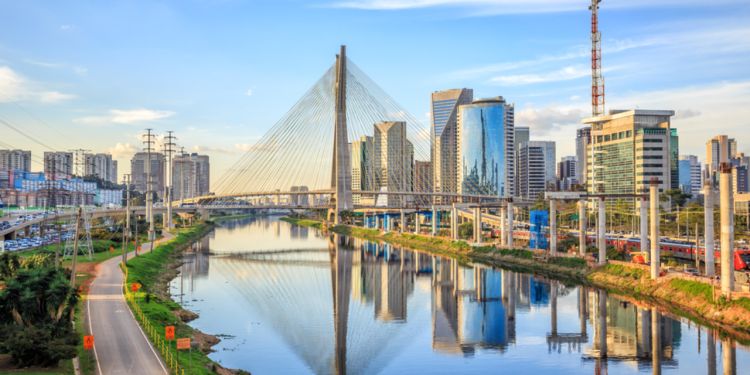
São Paulo is Brazil's largest economic center by far, with many Brazilian firms headquartered here, as well the offices of dozens of multinational companies. The state of São Paulo has large agricultural and manufacturing components, and the capital city of São Paulo is its financial heart. São Paulo is without question the premier financial center of Brazil and South America. With its diversified economy and large services sector, it offers jobs for those with the requisite skill sets. It can also offer an excellent quality of life. But if you'd like to work there, you're advised to begin your search for a job from abroad. You can begin by reviewing Expat.com's general guidelines for working in Brazil.
About São Paulo
São Paulo is the largest Portuguese-speaking city in the world. So if you know this language, you'll feel right at home here.
Not only that, but Great São Paulo is the most populous city in Brazil and the 12th most populous on the planet. This makes it a great place to live if you like the hustle and bustle of a big city.
The economy of São Paulo
São Paulo state has been at the center of economic power in Brazil since the earliest days of the country. It first grew wealthy on coffee. The state soon diversified agriculturally. Then manufacturing, both light and heavy, became a major component of the state's economy. And the city of São Paulo, as the state's financial center, grew in wealth as well.
Brazil has only just recently emerged from a recession. São Paulo wasn't spared, but it's fared better than most of the country, due in part to the diversity of its economy. The city's gross product still surpasses that of many US states and indeed, many countries. In fact, it has the 11th biggest GDP in the whole world and the city alone has over 10% of all Brazilian GDP.
Agriculture still plays an important role in the state's economy. In fact, agricultural output has almost doubled in the last 20 years. Major crops include bananas, tomatoes, rubber, limes, peanuts, tangerines, persimmons, sugar cane, and oranges. However, the number of jobs in this sector has declined, in large part due to mechanization.
There are more jobs to be found in manufacturing in and around São Paulo city. Major industries in the area include textiles, electrical appliances, furniture, foodstuffs, chemicals, and pharmaceuticals. The production of automobiles, automobile components, and also computers is expanding. São Paulo produces most of Brazil's ethanol. The well-known aircraft company Embraer is located in nearby São Jose dos Campos.
Financial services now form a large and growing part of the city's economy. The retail and services sectors are also large. Almost 400 companies are listed on São Paulo's B3 Stock Exchange (Brasil Bolsa Balcão S.A ), which has a capitalization of over R$44,000 million (Brazilian reals). Banking forms a major component of the local economy, with many major international banks represented. Much financial activity is centered on the prestigious Avenida Paulista. For on-the-ground job searching, this is the place to begin.
Sectors with potential
As noted above, the economy of São Paulo is quite diversified. Some of the largest companies in São Paulo state are in food, oil and gas, retail, energy and infrastructure, beverages, IT and telecom, and the automotive industry. However, the majority of jobs are to be found in the finance, services, and technology sectors.
Many large Brazilian and international companies are represented in Rio. A good place to begin your research is the São Paulo government's official site.
For those with backgrounds in education (certified teachers or education administrators), there are several international schools located in São Paulo to which you can apply. These include Escola Internacional São Paulo, The British College of Brazil, Chapel International School, St. Francis College, Escola Americana de Campinas (nearby), St. Paul's School, Pan American Christian Academy, The American Elementary and High School, and Red House International School.
Writing a Brazilian resume
Seeing as the main language in Brazil is Portuguese, you need to write your resume in this language. The exception is if you're applying for a job at a multinational company; in this case, you might be able to use English. However, we'd suggest applying in Portuguese if possible, as this will make you stand out more.
Your resume shouldn't be any longer than two pages. This means the information you put down should be what's most relevant and pertinent to the position. You'll list your prior experience/jobs and qualifications. Go in backward order, starting with the most recent information. You should also put down your education (excluding elementary education).
Before you apply for a job, you should also type up custom cover letters for each application. Like with any other western cover letter, you need to tell the company why you'd be a good fit for the position and what you can help them achieve.
Finding Work in São Paulo
Now that you know how to write a resume and cover letter, the next step is to actually apply for jobs. Here are some ways you can find work in São Paulo.
References and networks
Word of mouth networking still works very well today, especially if you're talking about international work. It's especially useful if you've got friends from Brazil or they know people who are and can help you out. So it can be a good idea to put your social network to use and start contacting people again.
Newspapers
This is a bit old-fashioned, but it's also still a good channel to try. If your local area doesn't get Brazilian newspapers, you might be able to find digital versions, as many newspapers now cater to their more technical audiences.
LinkedIn is a social media platform popularly used all over the world. It's used for making business connections, which means there's a job search function on the website.
You can easily upload your updated resume on LinkedIn so you don't have to retype it every time you apply for a different job. You can also set parameters to just work in São Paulo and the nearby areas to get tighter job search results.
Once you've applied, keep an eye on your inbox, as HR will contact you there. If you're lucky, you might even be headhunted by a recruiter, especially if you've got valuable skills. Do note that this doesn't happen too often, as Brazilian companies need to try to hire talent within the country first before they can hire foreigners. And even if they do, their company needs to have at least two-thirds of their workforce as native Brazilians.
The exception to the above is if you're married to a Brazilian citizen, have a Brazilian-born child, or if you've lived in Brazil for at least 10 years.
Websites
This sounds vague; what you should really do is check inter-governmental and multinational firms' websites if you're qualified for jobs in these areas. Another avenue you can try is your own home country's embassy website since they'll have job openings in Brazil listed. Not only that, but embassies also often post lists of international firms. You can use those lists to check for positions you might be qualified for.
Employment agencies
If you're on a tight budget, then employment agencies might not be a good idea. However, it can be worth it to put some money down, as these professionals are in Brazil and have a firsthand look at what jobs are available. They can inform you of the opportunity before others snatch it up, which can make all the difference in finding gainful employment in a new country.
Things you should know
As we've pointed out in the resume section, knowing Portuguese is a huge plus. You'll be better able to communicate with your coworkers and get through paperwork easier. And if you also know English, that's even better! There are plenty of jobs in both the private and public sectors that are looking for people who know multiple languages.
For an easier time, you should try to work for a multinational company in your home country and then ask for a transfer to Brazil. If you're unable to do this, not only are there the above restrictions but your titles and certificates obtained in your home country won't count in Brazil. This means that you need to retake the exams in Portuguese and get the Brazilian versions, which can take some time.
Lastly, be careful of scams. Many fraudsters pose as recruiters and employment agencies, so do your due diligence before you hand over any money. And if what they're offering sounds too good to be true, it most likely is.
Work culture
Expats who are from Western countries (or are familiar with them) won't have a difficult time adjusting to working in São Paulo. For the most part, Brazilian work culture is about the same. The workplace is hierarchical in nature, as well as corporate and formal.
On that note, if you land a corporate job, then the people you work with should have a good grasp of English. In general, the younger the workforce is, the more fluent in English they'll be. This is thanks to modern education placing more emphasis on learning English.
Due to a formal workplace, you'll have to dress professionally and not casually. Appearances are important in Brazilian workplaces, so you need to be on your toes.
When you head into meetings, don't be surprised if your colleagues, superiors, and clients arrive late. This is because Brazilian culture is laidback when it comes to timekeeping, so it's common to see people arrive at meetings 10 to 20 minutes later than planned. As tempting as it might be to do the same, it's still good practice to be punctual, as it'll make a good impression. Just be prepared to wait.
Another thing that might seem contradictory to a formal workplace is how people interact with one another. The fact is, interpersonal relationships are of utmost importance, so you should make an effort to get to know your coworkers. It's common to hug when greeting each other, and if you and/or the person you're greeting is a woman, expect to exchange kisses on both cheeks.
The thing you should know about Brazilian culture is that it gets more informal as you go from south to north, for both social and office settings. São Paulo is in the middle of the country, so some level of casualness is to be expected.
Living in São Paulo
São Paulo is a sprawling metropolis, which can be a bit intimidating. However, in many ways, it's more an agglomeration of several separate, self-contained cities. While many commute to work downtown on Avenida Paulista, many others work and conduct their lives near their homes. For getting around, the city offers an integrated metro and bus system that covers almost all of the city.
For those earning good salaries, São Paulo offers a good quality of life. While São Paulo is notorious for its traffic jams, and its weather isn't as good as that of Rio (with which São Paulo has an ongoing rivalry), Paulistanos, as the locals are called, are proud of their city and all it offers. There are many cultural events, such as sporting matches and concerts, and also many museums.
São Paulo is ethnically varied, with huge Japanese, Italian, Lebanese, and Portuguese enclaves. Given its ethnic diversity, it should be no surprise that the city offers just about every type of cuisine imaginable. It also boasts a vibrant (if pricey) nightlife scene.
Foreigners in Rio prefer to reside in the western zones in bairros such as Vila Mariana, or in the south zone, in neighborhoods near the sprawling Ibirapuera park. There are also some nice areas near downtown. While no one would say that São Paulo is cheap, rent prices are often actually lower than in Rio de Janeiro, and there's a much larger supply of units.
For those with the right skill sets (and who love the big-city life), São Paulo is worth a look.
Useful links:
We do our best to provide accurate and up to date information. However, if you have noticed any inaccuracies in this article, please let us know in the comments section below.








